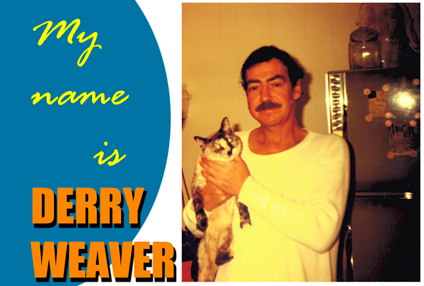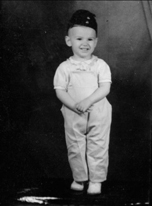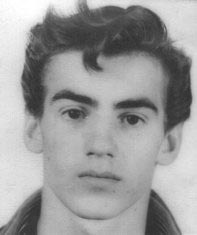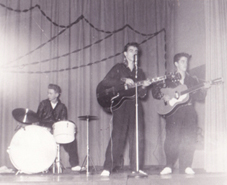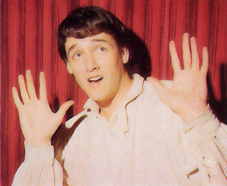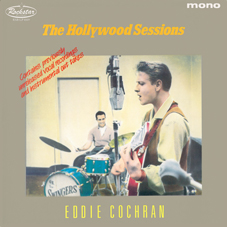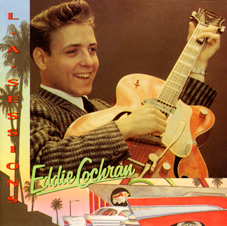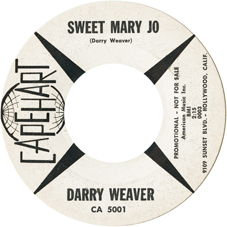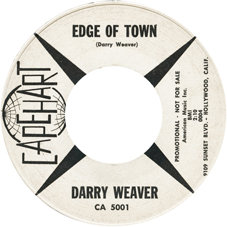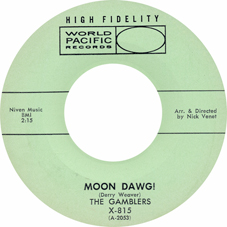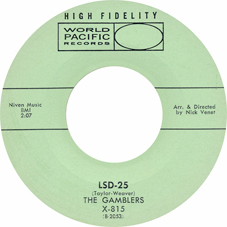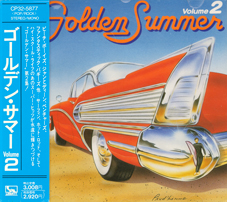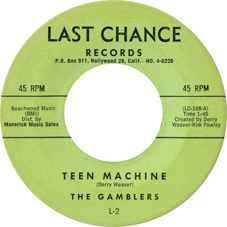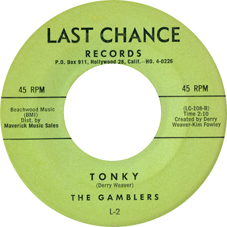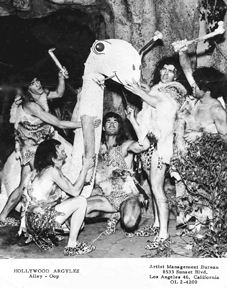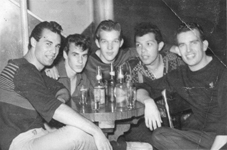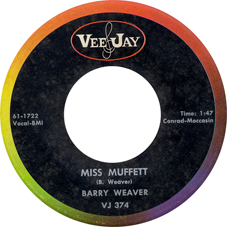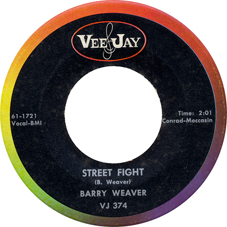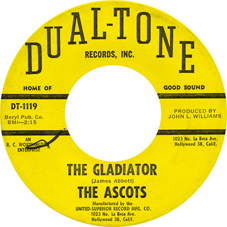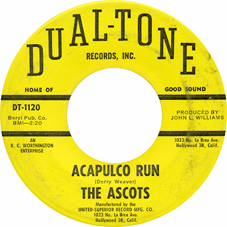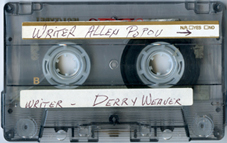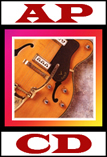Derry J. Weaver was born on November 22, 1940 in Lethbridge, Alberta (Canada).
He was strumming on his aunt's guitar when he was about 4 years old. Said
Derry : 'From grade 1 to 5, I was winning the
Alberta music festivals, singing in a high squeaky voice. Then there were
church stage shows and finally, we put together a 3-piece band called 'The
Rockers'. We ended up playing on TV here in Lethbridge'.
Don
Zech, a Canadian researcher on early Rock'n'Roll, told me that he had had
some contact with Derry's original band and it is almost certain that the
other two guys in 'The Rockers' were Jerry Arnold and Dennis Goshimonn.
At least, one well-worn 78 rpm acetate exists of Derry and Jerry doing 'Bye,
Bye Love' and 'Mean Woman Blues'. According to Zech, it was recorded at
a local record store.
More crucial information about this period came in 2014 from another
native of Lethbridge, David Orser : 'I knew Derry a little, I was a good friend of his younger brother.
I was also fascinated with the info on his association with Jerry Arnold in his younger days. I too played with Jerry for a few years in the late 60’s in a group called “The Chosen Few Inc.” and again a couple of years ago as Jerry & Dave (plus drummer). []
I have a picture of Derry and Jerry in their first group from way back in the day and I thought you might find it interesting. I am sorry, I can’t remember who the drummer was'. Thank you, David, for sharing with us this wonderful photo which appears at left. Jerry Arnold and his band, The Rhythm Captains, went on to record several acclaimed rockers on the Security label.
Derry and his band then got to play with Wilf Carter (whose stage name was Montana Slim) : 'We were way under age. To me, it was a look at how the professionals
played. Soon after, I was on my way to Hollywood'.
In California, Derry was a contemporary with many other young aspiring singers & musicians such as James Marcus Smith (a vocalist who would become Jett Powers first, then, at Sharon Sheeley's suggestion, P.J. Proby), Bruce Johnston (piano player, later to join The Beach Boys and one half of Bruce & Terry), Larry Taylor (Mel Taylor's brother and later bass player with Canned Heat) and Elliot Ingbar (guitarist, a future member of Frank Zappa's Mothers Of Invention and Captain Beefheart). They soon became friends and began hanging around, playing wherever they could. In 1958, a band called The Moon Dogs was born, featuring Derry, Jett, Elliot, Larry and Marshall Leib (who would soon join The Teddy Bears, with Phil Spector). In the June 1981 issue of Goldmine, it was reported that the quinted dissolved after just six months but after having won some local fame with tunes like 'Moon Dog' and 'Moon Cat'. Were these the prototypes for 'Moon Dawg' and 'Moon Kat' ? More on that in a minute (or two).
As you can see, the mass of burgeoning talent in the Los Angeles area was quite impressive and these youngsters will never be thanked enough for their contribution to Rock'n'Roll music in spite of all the traps set by the establishment to wholly eradicate this kind of music. Derry happened to be in the right place at the right time. In 1959, he began dating Mary Jo Sheeley, who was none other than Sharon Sheeley's little sister. Hence the famous Eddie Cochran connection which opened many doors to Derry Weaver then - and introduced him to thousands of music lovers later on. It took exactly 26 years and another immaculate RockStar album ('Eddie Cochran - The Hollywood Sessions', RSR-LP 1009), full of alternate takes and unissued cuts, to discover that Derry had shared a recording session with Eddie at Gold Star on August 25th, 1959. Of course, Eddie was on lead guitar, Jim Stivers on piano, Connie 'Guybo' Smith on bass and Gene Riggio at the drumkit. Two tracks appeared on that 1985 LP : 'Bad Baby Doll' and the very rocking 'Itty Bitty Betty' which featured a typically intense solo from Cochran. Both songs were later put onto CD by RockStar ('L.A. Sessions', RSR-CD 003), including the 'Bad Bay Doll' false starts and a bonus third song from the session, 'Lovin' I'm Wastin' (takes1-3). Jerry Capehart was the producer ; said Derry : 'You can tell by Jerry's voice on the out-takes that he pushed us pretty hard. Pissed us off, but got the job done !'
Derry
was kind of working for American Music, mailing records on the Silver and Capehart
labels to radio stations. Jerry soon became Derry's manager and Weaver had a
single out on the Capehart label (#5001), his first name being misspelled 'Darry'
: 'Sweet Mary Jo'/'Edge Of Town'. The latter is a good rocker while the other side sounds a lot like some of the songs cut by Jewel (Akens) and Eddie (Daniels). Derry insisted that 'Eddie
Cochran helped me with both these songs as well as other demos'.
The demos in question include : 'In My Rockin' Chair', 'Indian Fighter', 'Empty
Bottles' and 'Street Fight'. Let's clear one thing, though : 'Eddie
did not play on those songs but we used his drummer' - Gene Riggio, that is. This would have taken place in late 1959.
Eddie's death in England on April 17, 1960, came as a terrible shock : 'I
was living with Mrs. Sheeley, Sharon and Mary Jo. [] We were all like family
before Eddie was gone. Ricky Nelson was always at the house and sometimes his
brother, David, too. Eddie helped Sharon write 'Poor Little Fool' for Ricky.
They gave her full credit for the writing because it was her idea. Sharon was
like my big sister - she looked after everyone ! [] The phone call came about
the accident. Supposedly, Eddie was lying on the road, guitar still in his hand.
Sharon's back was broken. We cried and cried. We knew Eddie was gone. We didn't
know if Sharon would make it. They didn't tell us if the cab driver or Gene
were alive until later. They were running late to make the airport to come home.
This whole thing devastated a lot of people forever. When I worked at Capitol,
Jerry Capehart would be in the elevator. We would say hello, look at each other
and couldn't say anything - just tears'.
Derry
had progressed as a guitar player, obviously influenced by Eddie : 'I
loved the basic Blues. I asked Eddie : 'How do you play that ?'. Because if
we had a few beers, we always got to the Blues - BB King, Bobby Bland... You
wouldn't believe how Eddie could play some of this stuff ! He showed me. I still
use some of those same licks to this very day. Eddie said : 'Try not to sound
white. You have to put your heart and soul into it'.
Sometime during 1960, an instrumental single of superb quality and lasting impact
was issued on World Pacific, a label that Liberty Records had just acquired, by The Gamblers : 'Moon Dawg'
b/w 'LSD-25' (# X 815), pressed on styrene and not vinyl. The group consisted of Derry Weaver (lead guitar), Larry Taylor
(bass), Bruce Johnston (piano), Elliot Ingbar (rhythm guitar) and Rod Schaffer
(drums). Written by Derry, 'Moon Dawg' was an instant classic - a blasting guitar
rocker with a stunning drum intro and some nice dog howls courtesy of Nick Venet
who 'arranged & directed' according to what was written on the record label
: 'Nicky didn't arrange anything except the deal with
World Pacific in exchange for the publishing. We'll let him have that one. He
also did the dog howl. Great job. We were all standing around the mike singing
'ah-ah-ah-ah-ah-ah' and Nick howled. Great overdub ! One take'.
As
far as I know, 'Moon Dawg' has never appeared in stereo, even on later compilations
such as the brilliant Japanese 'Golden Summer -Vol. 2' (CP32-5877). Since there were vocal overdubs, a stereo mix might exist although it would probably sound less powerful than the mono. The
excellent flip, 'LSD-25', co-written by Weaver and Taylor, was a moody, bluesier affair
: 'Yes, it was about a drug that made mice chase cats.
It was being experimented with at some universities. It was made from rye bread.
I never got into any drugs'.
Strangely
enough, the record was a hit only in L.A. and elsewhere in Southern California.
In 1961, the track was selected for the eclectic 'Golden Gassers' compilation on Capitol (T 1561). Echoes of 'Moon Dawg' are all over 'Wipe Out' for example and the tune was covered
by countless bands, mostly Californian we must admit. The Beach Boys were the first to do it on their 'Surfin' Safari' LP (Capitol T 1808) in 1962 but there were other excellent
versions by The Ventures (Dolton BLP 2010), The Challengers (Vault #902), The Tornadoes (Aertaun #102 &
Josie LP 4005), The Rhythm Rockers (Challenge LP 617), The Staccato's (Kandy
Cane #1004), The Surfaris (Decca LP DL-74487) and The Arrows (Tower #133, where
it became 'Moon Dawg '65'). Derry, still in the process of collecting all due
royalties, says that there have been over 25 different recordings of 'Moon Dawg'.
But there is an incredible twist to this story which I had first published on this very site in 2000 and revised in 2008. Five years later, a person who doesn't want her name to be disclosed, contacted me to correct some of the information I had got from Derry. We exchanged e-mails for a couple of years, which I synthesized into one piece for better comfort. I invite you to take a deep breath before reading what follows as it is a totally different account of the genesis of both The Gamblers group and their 'Moon Dawg' classic....
'Derry Weaver was not there from the start. He joined The Gamblers after 'Moon Dawg' and 'LSD 25' were recorded. The composer and founder of that group was Art Wiggs. The Gamblers were started in the San Fernando Valley by Art Wiggs on lead guitar, Bruce 'Buzz' Johnston on piano and Bill Finch on bass guitar. Others involved were Frank Crawley and Dave Marshall. Don Porter and Bob Eubanks were involved in the promotion end. Don Porter, who had planned a tour for the group, was the one who came up with the 'LSD-25' title. Art wasn't into drugs and hated that title. The coyote howl on 'Moon Dawg' was also Don's idea. Art Wiggs played a Fender guitar at the time of the recordings. However, before the tour began, Art broke up the group. He has always been a family man and knew that the road was too hard on such. When Art called it quits, Bruce Johnston was still in the group and he was able to keep the Gamblers name. This is why there wasn't any lawsuit.
Everyone went their own way but Art Wiggs and Bill Finch (who also sang) performed together for a short time afterwards. They did use 'LSD-25' but called it something else when performing it on stage !
Art went on to work for major corporations in upper management in the San Fernando Valley and, later on, the Silicon Valley ; he had started working for them during summer breaks while at Canoga Park High School.
He also became involved with 'Texas Guitar Shows' and was the owner of 'Wings Guitar', a guitar repair shop. Quite a few people know him from 'Wings Guitar', like Brian Setzer, Duke Kramer and Fred Gretsch.
When his wife, Charlotte, died from cancer on July 23, 2005, Art decided to move to Fresno after selling the house he had built in San Jose in 1971/72.
He's been a friend since 1950 and we both graduated from Canoga Park High in 1956.
His interest in music came at about 19 years old ; before that, sports was his main interest. He played football. His parents were both musicians. He got into guitar repairs when his late wife became ill, so he could work from home.
If there are any royalties to be made from 'Moon Dawg', they should belong to Art Wiggs. He is a real Renaissance Man.'
There are a few things that still need to be cleared up, like when and where the basic instrumental tracks to 'Moon Dawg' and 'LSD-25' were cut, were they intended to be released on World Pacific at that stage and did Bruce Johnston bring the tape and the new group to Nick Venet for instance. But the story seems more than highly plausible in retrospect, especially given the fact that Derry eluded certain questions I asked him and also because there would never be powerful guitar soli like those in 'Moon Dawg' in his other recordings.
The Gamblers had a fine follow-up single in 1961, on the Last Chance label (#L-2) : 'Teen Machine' b/w 'Tonky', both numbers written by Derry Weaver and 'created by Derry Weaver-Kim Fowley' as the record label read. This time, Derry, Larry and
Elliot were still present but Howard Hirsch played keyboards and the drummer
was Larry's brother, Mel Taylor (a soon-to-be member of The Ventures). 'Teen
Machine' is an organ dominated piece but with some pretty strong guitar in the background and excellent drumming. The intro is somewhat reminiscent of 'Moon Dawg' but in a slightly toned down way. 'Tonky' is some kind of variation on 'Honky Tonk' jointly led by a tenor sax (Plas Johnson ? Mike Henderson ?) and a good reverb lead guitar.
At around the same time, a group by the name of The Hollywood Gamblers had a
single out on the Don label (#201), featuring the Weaver/Taylor-penned 'Moon
Kat'. Of course, most of the above gang was on it.
It seems also that Derry was involved in one way or another with The Teen Beats
who recorded for Original Sound. One of their singles (OS #16) featured Mel Taylor's
'Night Surfin'.
After that, it's very hard to follow Derry's career because he was busy
on all fronts. Besides those bands, he was cutting demos in studios around Hollywood
('for $5 each !) and he was largely involved with The Hollywood Argyles - at least,
the touring group. They were hot with 'Alley-Oop' (Lute #5905), cut at a drunken
session featuring Sandy Nelson on drums & screams while Gary Paxton and
Dallas Frazier shared the vocals. Still, it was a clever song which spent ten weeks in the charts starting in June 1960, ultimately reaching the coveted No.1 spot in July.
There were many covers, the best known being those by Dante & The Evergreens (Madison 130) and, of course, The Beach Boys ('Party' LP, Capitol 2398). The Argyles appeared on the Dick Clark Show (see picture at left, courtesy of Lauryl McMullin, his sister) and did a four-and-a-half
month tour afterwards : Gary Paxton was on vocals, Derry played guitar, Marshall
Leib was on piano, Bobby Rey played sax and Gary Webb drummed.
It is unclear if Derry played on the ensuing Hollywood Argyles album on Lute
(#9001) or on subsequent Gary Paxton productions.
1961 saw
the release of 'Street Fight'/'Miss Muffett' on the Vee-Jay label (#374) by
a certain... Barry Weaver. Yes, for the second time, Derry's name was spelled
wrong on a record : 'A friend of mine worked for Conrad
Music. [] Well, I ended up being the first white kid on Vee-Jay. I was not happy.
Somebody picked the wrong tapes and released unfinished demos on me. I was ticked
off. [] What you hear on that record is Larry Taylor on bass and Sandy Nelson
on drums. I put it all together and did all the overdubs at American Recording
Studio. That's where most everything was
done - even 'Alley-Oop'. Both songs, again written by Derry, are medium rockers, half spoken-half sung, with real good guitar sounds all along.
His next recording venture would yield another surf-style platter : 'Acapulco
Run' by The Ascots on Dual-Tone 1119/20 is a highly sought after piece by collectors
of the genre. Rare & nice, it is, but don't expect any sort of reverb guitar
twanger ! Trumpet and organ are the main instruments here, along with some electric
piano, the guitar being barely audible after the short intro. The label credits
read 'Produced by John L. Williams' ; 'Acapulco Run' was written by Derry Weaver
while the other side - 'The Gladiator', a forgettable effort to plagiarize 'The
Lonely Bull' - was penned by a certain James Abbott.
Sometime
during 1962, Nick Venet hired Derry to work with him at Capitol Records ; Nick
was A&R man and Derry assisted him for about four years, working with The
Beach Boys, Glen Campbell, Lou Rawls... Once again, he has never confirmed that
he played on some of the early Beach Boys tracks which would appear on the 'Surfin'
Safari' LP. What happened afterwards ? 'Never did
stop. Always doing sessions from Portland to Seattle to Prince George. Became
a cement finisher and spent many years in mining exploration'.
Ken Watson, from Kelowna, BC, wrote to me in 2010 and gave some very worthwhile information about Derry's later activities : 'I had the incredible fortune to play bass with Derry in Kelowna for 2 years with a band called Hi-Henry. When that band went its separate ways Derry disappeared from Kelowna and eventually found his way to Grand Forks. I left to form Special Blend and John Simmons (founder of Hi-Henry) joined me several months later. The time I spent playing with Derry was always a lot of fun with one of his favorite sayings “forget that Winnipeg good shit man, you got to play a lot further south than that”.
Unfortunately Derry lived with some demons from his past. One of which we could never get him to talk about but he alluded to some time spent in South East Asia, supposedly as an entertainer but when he really got in his “cups” he was doing more than just entertaining and it left him deeply scarred.
While playing with Derry I decided to start writing again and because I had always had an interest in the recording process I purchased a Tascam 4-track. To this day and no matter how hard I or my friends try, we have never come close to the quality of the demos he laid down in my basement. Unfortunately the original 4 track reel was destroyed when his cabin burnt down (in the Christian Valley I believe). [] Still looking for that mother lode, still the same individual marching to the beat of his own drum'.
Steve Scott, Derry's old friend, confirms that Derry sometimes played with a local band in Kelowna, British Columbia. In 2013, Mary Ann Bishop, a singer from Kelowna, wrote : 'Derry was so talented. Think I told you about the band "High Henry" which I was in with Derry for about a year. I only stayed with them for a year as some of the members were "high" too many times. So sad, such a talent'.
Those close to him panicked years ago when it was announced, during a re-run of the Dick Clark Show featuring The Hollywood Argyles, that he had died in a car accident in Canada. Not so !! In September 2000, Derry told me that he was putting together a new 'Gamblers' group and working on a new CD, tentatively called 'The Don't Pass Line'. From what I heard on a cassette-tape he sent me at the time, yes, the band could blow the doors off the wall !
As far as I know, nothing has since materialized. I lost contact with him in 2001 but I'm very grateful for his time and input, not to mention the very rare pics of him and of The Hollywood Argyles in Mexico. Sadly, Derry passed away in Grand Forks on August 23, 2013, from a heart attack consecutive to pulmonary problems. He was living in a trailer. He is survived by hisex-wife, Rose Ann, his daughter, Shelli, and his sister, Lauryl.
He sure was a restless soul but his untold story is stunning, indeed !
Copyright Paul Vidal * Privas, France * Summer 2000 - May 2008 - August 2019

